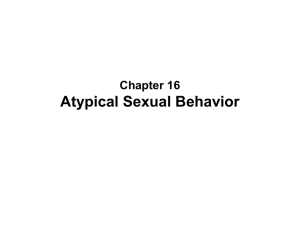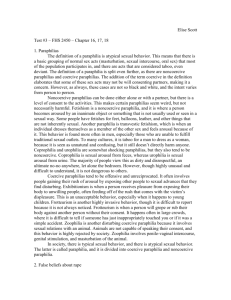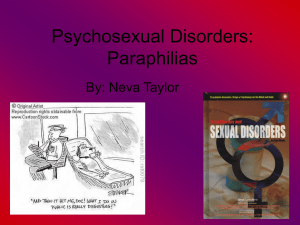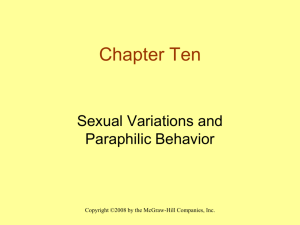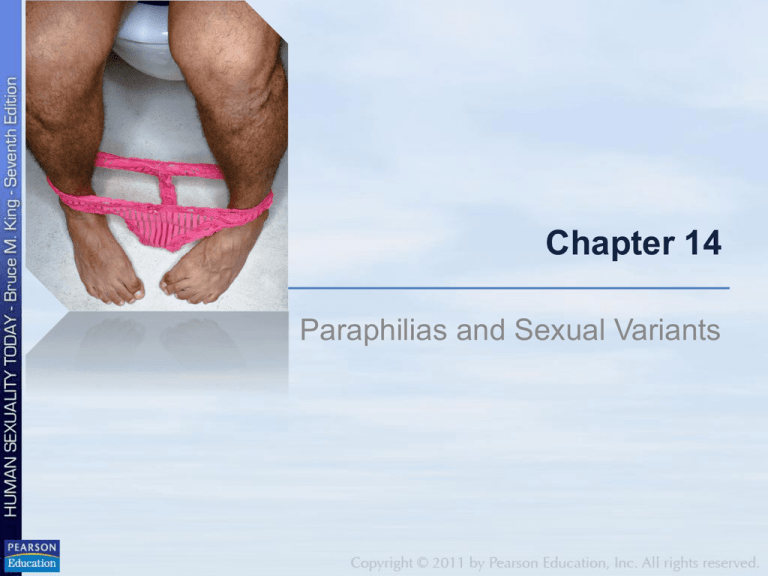
Chapter 14
Paraphilias and Sexual Variants
Defining “Normal”
Historical Perspectives
Mid 11th century, Christian perspective
• Missionary position only
• All other positions “unnatural”
Freud
• Only penile-vaginal sex is “mature”
Today’s DSM-IV-TR Definitions:
Paraphilia and Sexual Variants
Paraphilia: from Greek, “para” means other
and “philia” means love
Sexual arousal and gratification depends on
engaging in or thinking about unusual
behavior
Lasts at least 6 months
Sexual variants may be unusual but are not
the preferred behavior
Paraphilia, Sexual Variant, or Normal?
What do you think?
Walking naked on beach
and out of the view of
others =
Paraphilia
Sexual variant
Normal or acceptable
behavior
Multiple and Related Paraphilias
•
Over half in treatment for paraphilia report
engagement in 3 or 4 types of paraphilias
•
Some types of paraphilias cluster
together
•
Most developed fantasies by age 12 or 13
but fearful of disclosure or discussion
Courtship Disorders: Normal Phases
What are these normal phases?
• Finding potential partner
• Affiliation
• Tactile phase
• Copulatory phase
Voyeurism:
Disorder of “Finding” Phase of
Courtship
Description
Symptoms and
causes
Danger level
Exhibitionism: Disorder of Affiliative
Phase of Courtship
Obscene Phone Calls: Another
Affiliative Phase Disorder
Telephone Scatologia: verbal form of
exhibitionism
•
•
•
•
•
Description
Types
Causes and sexual turn-on
Consequences
Danger level
Frotteurism: Disorder of Tactile
Courtship Phase
Frotteurism: sexual arousal achieved primarily
by rubbing one’s genitals against others in
public places
•
Only considered paraphilic if engaged in
repeatedly as preferred form of sexual
behavior
Pedophilia
Pedophilia: sexual arousal is achieved primarily
and repeatedly through sexual activity with
children who have not reached puberty
Half or more of men diagnosed as voyeurs,
exhibitionists, telephone scatologists, or
frotteurists also meet criteria for pedophilia
Pedophile is at least 16 years old and at least 5
years older than child
Fetishism, Transvestism
and Related Paraphilias
Erotic fetishism: sexual arousal and gratification
almost exclusively by handling or fantasizing
about inanimate object
Partialism: sexual arousal focusing exclusively on
specific part of body
But what if I really enjoy leather?
Which is “normal”?
Transvestism
Edward Hyde, governor of New York (1702 – 1709) and a modern transvestite.
Most Transvestites Secretly
Cross-dress
•
•
•
•
Purpose of crossdressing
Reasons for crossdressing
Marital status
Transsexuals versus
transvestites
Personal Reflections
Do you believe that it is okay for consenting
adults to engage in any sexual behavior in
private as long as it does not cause physical
and/or emotional injury and does not
interfere with normal social and occupational
activities?
Why or why not?
Related Fetish-like Paraphilias
Nonhuman objects are focus:
• Urophilia
• Coprophilia
• Mysophilia
• Klismaphilia
Bestiality vs. Zoopilia
Beastiality: arousal through sexual contact with
animals
Zoophilia: beastiality is preferred over sex with
human partners
Sadomasochism (S&M)
S&M as a Sexual Variant
Mild S&M
behaviors
common
between
consenting
partners
Distinctive
feature of
S&M/D&S roleplaying sex games
is domination
and submission,
NOT extreme
pain
Pain is erotically
arousing only as
part of agreedupon ritual or
fantasy “script”
Involves power
exchange
Other Paraphilias
Necrophilia: arousal from having sex with dead
bodies
Autoerotic asphyxiation: individuals deprive
themselves of oxygen when highly sexually
aroused in hopes of intensifying orgasm
What Causes Paraphilias?
Paraphilias and obsessive-compulsive disorder
have many similarities
•
•
Freudian theorists
Learning theorists
Which theory makes the most sense to you?
Understanding Paraphiliacs
Can you fill in the blanks below?
•
Attitudes about and expectations of men and
women are ______.
•
Most paraphiliacs are _____, but generally
have history of other struggles.
Why are most paraphiliacs male?
What did the text convey?
Therapy: Does it work?
•
The large majority of paraphiliacs do not
want to change, stifling hopes of success in
therapy
•
Recidivism is very high
Therapy: Approaches
Traditional
psychotherapy
or group
therapy
Confrontational
approaches
Behavioral
approaches
Desensitization
Social skills
training
Medical
approaches and
medications
Multiple
methods
Personal Reflections
Do you engage in sexual practices that may be
physically or psychologically harmful to
yourself or others (e.g., exhibitionism,
obscene telephone calls, voyeurism,
sadomasochism, pedophilia)?
If so, have you sought therapy to help with your
behavior? If not, why not?



